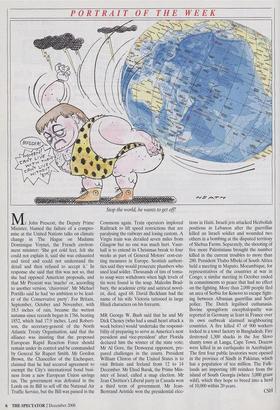PORTRAIT OF THE WEEK
Mr John Prescott, the Deputy Prime Minister, blamed the failure of a compro- mise at the United Nations talks on climate change in The Hague on Madame Dominique Voynet, the French environ- ment minister: 'She got cold feet, felt she could not explain it, said she was exhausted and tired and could not understand the detail and then refused to accept it.' In response she said that this was not so, that she had opposed American proposals, and that Mr Prescott was 'macho' or, according to another version, 'chauvinist'. Mr Michael Portillo said he had 'no ambition to be lead- er of the Conservative party'. For Britain, September, October and November, with 18.5 inches of rain, became the wettest autumn since records began in 1766, beating 1852, which had 17.9 inches. Lord Robert- son, the secretary-general of the North Atlantic Treaty Organisation, said that the alliance was insisting that the proposed European Rapid Reaction Force should remain under its control and be commanded by General Sir Rupert Smith. Mr Gordon Brown, the Chancellor of the Exchequer, claimed that he had secured agreement to exempt the City's international bond busi- ness from a new European Union savings tax. The government was defeated in the Lords on its Bill to sell off the National Air Traffic Service, but the Bill was passed in the Commons again. Train operators implored Railtrack to lift speed restrictions that are paralysing the railways and losing custom. A Virgin train was derailed seven miles from Glasgow but no one was much hurt. Vaux- hall is to extend its Christmas break to four weeks as part of General Motors' cost-cut- ting measures in Europe. Scottish authori- ties said they would prosecute plumbers who used lead solder. Thousands of tins of toma- to soup were withdrawn when high levels of tin were found in the soup. Malcolm Brad- bury, the academic critic and satirical novel- ist, died, aged 68. David Beckham had the name of his wife Victoria tattooed in large Hindi characters on his forearm.
MR George W. Bush said that he and Mr Dick Cheney (who had a small heart attack a week before) would 'undertake the responsi- bility of preparing to serve as America's next president and vice-president' after Florida declared him the winner of the state vote; Mr Al Gore, the Democrat opponent, pre- pared challenges in the courts. President William Clinton of the United States is to visit Britain and Ireland from 12 to 14 December. Mr Ehud Barak, the Prime Min- ister of Israel, called a snap election. Mr Jean Chretien's Liberal party in Canada won a third term of government. Mr Jean- Bertrand Aristide won the presidential elec- tions in Haiti. Israeli jets attacked Hezbollah positions in Lebanon after the guerrillas killed an Israeli soldier and wounded two others in a bombing at the disputed territory of Shebaa Farms. Separately, the shooting of five more Palestinians brought the number killed in the current troubles to more than 280. President Thabo Mbeki of South Africa held a meeting in Maputo, Mozambique, for representatives of the countries at war in Congo; a similar meeting in October ended in commitments to peace that had no effect on the fighting. More than 2,000 people fled an area of Serbia for Kosovo to escape fight- ing between Albanian guerrillas and Serb police. The Dutch legalised euthanasia. Bovine spongiform encephalopathy was reported in Germany as fears in France over its own outbreak alarmed neighbouring countries. A fire killed 47 of 900 workers locked in a towel factory in Bangladesh. Fire destroyed 1,300 shacks in the Joe Slovo shanty town at Langa, Cape Town. Dozens were killed in an earthquake in Azerbaijan. The first four public lavatories were opened in the province of Sindh in Pakistan, which has a population of ten million. The Falk- lands are importing 100 reindeer from the island of South Georgia (where 3,000 graze wild), which they hope to breed into a herd of 10,000 within 20 years.


















































































 Previous page
Previous page